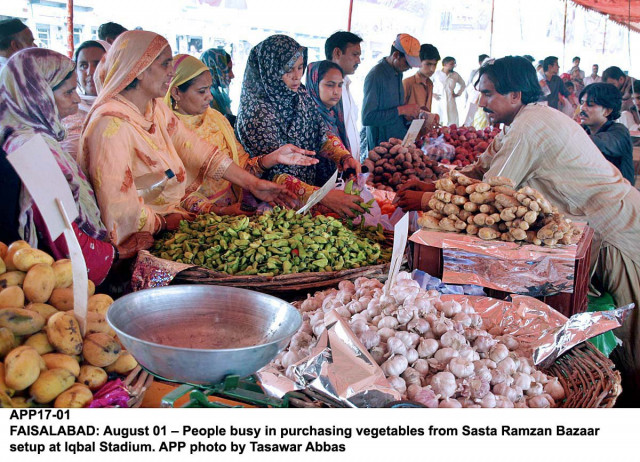Inflation rises 3.41%, but remains manageable
Reading comes as SBP signals stable govt-administered prices, low inflationary expectations

The slow pace of increase in prices was largely in line with the trends witnessed in the previous fiscal year when the average rate of inflation had remained at 4.16%, significantly below the official target. PHOTO: APP
Measured by the Consumer Price Index (CPI), the inflation indicator rose 3.41% against 2.91% a month earlier, the Pakistan Bureau of Statistics (PBS) said on Tuesday.
On a month-on-month basis, the inflation rate rose 0.19% in August. Higher prices of food items such as onion, tomato and mango were the main reason behind the increase in month-on-month rates.
The slow pace of increase in prices was largely in line with the trend witnessed in the previous fiscal year when average inflation stood at 4.16%, significantly below the official target.
Average inflation for July and August 2017 remained at 3.16%, said the PBS.
However, it seems that the relationship between the printing of currency notes and inflation has eased, as during the last fiscal year, the central bank printed more than Rs900 billion worth of currency notes to support the government and finance the budget deficit.
In its last monetary policy, the central bank voiced hope that average headline inflation, though higher than the last fiscal year, was expected to be lower than the earlier outlook and would stay below the target of 6%, mainly on the back of favourable supply conditions.
July FY18: Inflation falls to lowest level in 20 months
On a year-on-year basis, the non-food non-energy inflation, commonly known as core inflation, decelerated slightly to 5.5% in August, according to the PBS.
Among 89 commodity groups of the CPI, the core inflation covers price movements in 43 items.
The State Bank of Pakistan (SBP) uses core inflation while formulating its monetary policy. The effect of monetary policy on prices is reflected in core inflation with a time lag, making it a good predictor of the future CPI inflation.
The high core inflation was because of a surge in the cost of health, education, transport and housing, said an official of the PBS.
The cost of health services went up 12.5% in August than a year ago. Education cost increased 10.8%.
However, concerns remained over the PBS methodology to calculate the inflation rate as it was not fully capturing the price levels.
Inflationary trends in recent months could be attributed to an increase in domestic demand supplemented by China-Pakistan Economic Corridor (CPEC)-related activities and house rent, which had a significant impact on inflation because of its 21.8% share in the CPI basket, according to minutes of the MPC.
CPI inflation stands below target at 4.16%
The committee noted that adequate supply of major food items, only partial pass through of recovery in global oil prices to domestic consumers and unchanged government-administered power tariffs contributed to an overall benign inflation environment.
It said the average CPI inflation was projected to be in the range of 4.5% to 5.5% in fiscal year 2017-18. This projection is explained by lower-than-anticipated increase in international oil prices, recent behaviour of CPI inflation in June 2017, stable administered prices and lower inflationary expectations.
While recognising emerging challenges on the external front, the MPC maintained the policy rate at 5.75%, which was slightly higher than the core inflation rate.
In the previous fiscal year, the current account deficit widened to a record $12.1 billion, which was expected to increase further in the new fiscal year. This may bring the rupee-dollar parity under stress, although authorities would defend the existing exchange rate.
Prior to Eid holidays, Prime Minister Shahid Khaqan Abbasi told Karachi-based businessmen that his government would not let the rupee depreciate against the US dollar.
Any depreciation would put pressure on the inflation rate due to its impact on imported goods including crude oil.



















COMMENTS
Comments are moderated and generally will be posted if they are on-topic and not abusive.
For more information, please see our Comments FAQ